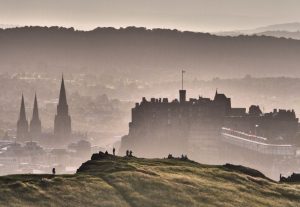
Photos: Rob Bruce
Climbing Arthur’s Seat on an overcast March day, thinking about politics, I wonder if Nicola Sturgeon is going to call a second independence referendum; if Theresa May is going to trigger Article 50 next week. Holyrood Park is busy – the route to the top is thronged and I hear snatches of conversation in many languages: French, then Polish, French again. A group of fit-looking German men files onto the path above me. It seems to me, returning after an absence of a few months, that Edinburgh increasingly feels like a European capital.
Behind me an English student is entertaining a visitor: “This is ten minutes from campus.” They are arguing about whether the rock paths laid on the hillside to protect it from erosion could be considered natural. “Is an anthill natural? Ants modify their environment.”
I move aside to let them pass, looking down at the upturned boat shapes of the Scottish Parliament, designed by Spanish architect Enric Miralles, at the entrance to the park. There, the gold stars of the European flag are flapping in the breeze. I consider the issue of the rights of EU citizens resident here.
First Minister Sturgeon has assured the many European citizens who live and work here that their contribution is valued and their rights will be protected as far as she is able. This is in stark contrast to the mood music coming from the government in London. The situation north of the border is different. Scotland’s population has hardly risen in a century and it needs more immigration not less. The country benefits hugely from the presence of the EU nationals who work in every area of life and it is an issue of general concern that they have had almost a year of uncertainty and anxiety about their status. Friends of mine are in this category and I can only imagine how difficult it is.
EU nationals resident in the rest of the UK have not been treated with respect by their government. It is all very well for Tories, like Lord Forsyth on Any Questions on BBC Radio Four last night, to denounce their worries as needless and say they should apply for citizenship. But that costs almost £1000 for an adult or a child. Some don’t want to do it anyway. And rumours fly – the fact that the Westminster government has not chosen to unilaterally guarantee their right to remain suggests it may be bargained with.
It is a compelling argument for an independent Scotland in the EU that it would mean Scots free to work and trade across Europe and the many amazing Europeans who choose to live and contribute here could do so with confidence.
I carry on with the climb, looking over as a shaft of cool, northern light illuminates the huge dome of Edinburgh University’s McEwen Hall. This place sees an increasing number of Europeans in graduation gowns; it is popular with EU students who can study on more favourable terms than south of the border, and they are now more than ten percent of the intake. Edinburgh’s resounding 75% vote to remain in the European Union, higher than anywhere in the UK, adds to the sense of welcome.
There is a sense of shared belief, shared purpose, shared goals with other European countries. The European project to work closely together to avoid conflict on our continent, to guarantee human rights and to treat people equally, chimes with Edinburgh’s values. Over in the west of the city, I can see the top of another impressively-domed building, the Usher Hall. At the International Festival founded in 1947, when the musicians and artists of the continent strived to replace the guns of war with the language of culture, the Austrian Jewish pianist Artur Schnabel returned from the US to play there. And the Vienna Philharmonic, which contained 60 former members of the Nazi Party, played there too.
I carry on up the hill, this time tuning into the conversation of two locals entertaining a European visitor. “It’s only an hour’s drive to England, but London is eight hours drive.” They tell their friend that the north of England is being badly managed from the south of England. “They are on the point of rebelling.”
That may be wishful thinking. But it is a reminder of another concern for me: that the current Westminster government is led by the right-wing of the Conservative party and that it’s approach to Brexit is ideological and frankly reckless.
While breakfasting on porridge and tea this morning, I listened to the Director of the Centre for European Reform Charles Grant tell Good Morning Scotland that not enough people in London understand the legal, financial and technical complexity of Brexit: “Our partners in Europe worry that the people with the most influential positions around number 10 and the Prime Minister are not great EU experts, and they worry that the British don’t know what they are getting into. You can’t just cut through all this boring bureaucratic stuff. You can just leave the EU. But then there’s no law governing contracts, there’s no law governing companies working in the EU but based in Britain or vice versa, or the rights of individuals living in the EU or vice versa.”
Boris Johnson is still saying all this will be easy. Does he know what he’s talking about? Johnson and his colleagues are burning bridges and damaging alliances across the continent. Perception is important and they are creating the impression that England is not friendly to Europe.
The Westminster government is also ignoring the spirit of the devolution settlement and all that was said in the run up to the last independence referendum about the UK being a union of equals. In a union of equal nations, the fact that one of them clearly voted a different way would be regarded as an important issue, not dismissed as if this were the same as an equivalent number of voters in the other country. Appearing to treat Scotland’s institutions with contempt may be a dangerous course.
Taking a breather on the edge of the path, I hear a cough and an “Excuse me”, right behind me. A middle-aged English couple, lightly dressed for a muddy afternoon on the hill, seem to be in some difficulty getting out of a rocky dip up onto the path where I am standing. I stretch out a hand and help the woman, who is ahead, up onto firmer ground. They smile and thank me.
My third issue in terms of a second Scottish independence referendum is that the prospect of Scottish independence would be a cause for regret in many ways. We have had a long alliance with the other UK countries, I feel at home down south and would be reluctant to give up my share in it. It seems to me it would be worth considering this challenging course only to preserve our membership of the EU. A future being out of both the EU and the UK sounds like isolation. But I also wonder if Scotland can best exert its influence on the situation by holding a second referendum. If Scotland votes ‘Yes’ this could be grounds for a second referendum on EU membership.
The UK will likely dissolve. If there is a hard Brexit, surely it would be folly for the Westminster government to try to maintain a hard border across 300 miles of Ireland. And Dublin presumably would be reluctant to do so. The obvious answer would be to move the border to the mainland, and create a united Ireland.
For England, if an independent Scotland were going to remain part of Europe, the best hope of managing the future relationships of the former UK countries would be for all to be part of the EU. That would allow the common travel zone to continue, free trade and so on. Surely, England would have to think again?
I reach the rocky summit, worn smooth by legions of feet over the centuries, and look across the city to the blue of the Firth of Forth and Fife beyond. Here is gathered a polyglot crowd of – mostly – the jeunesse Europeene.
Something has shifted in the emotional landscape. In 2014, Scottish independence would not have been welcomed in other EU capitals. It was viewed as divisive. But now, Scotland’s civic nationalism is seen more positively in contrast with the right-wing views populism of ‘Les Brexiteers”.
As I stand here, my dog resting after the walk, looking down towards the port of Leith and the Firth beyond where ships once brought wine from France, where a new bridge spans the waterway, I feel perhaps Scotland should seize this moment. I was a No voter in 2014, but if Nicola Sturgeon triggers another independence referendum next year, while Scotland is still a member of the EU, I will vote ‘Yes’. The situation has changed, and I have changed my view.

